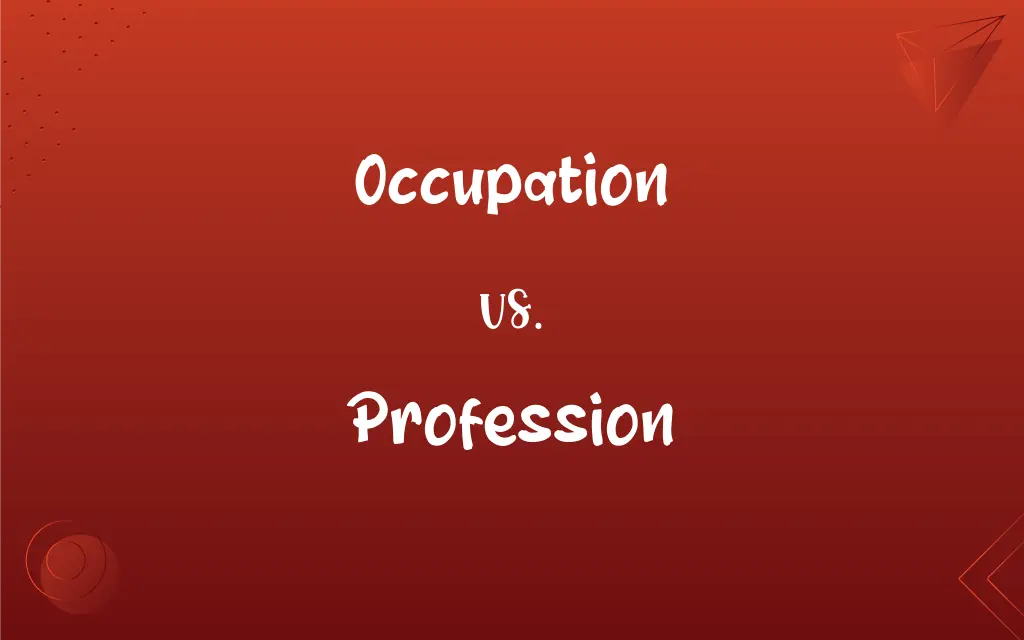Occupation vs. Profession: What's the Difference?
Edited by Janet White || By Harlon Moss || Updated on October 3, 2023
Occupation refers to a regular activity performed for payment, while profession implies a calling requiring specialized education and training.

Key Differences
In everyday vernacular, the terms "occupation" and "profession" are often used interchangeably. Occupation generally refers to any regular activity that a person engages in, typically for payment. Thus, it embraces an extensive range of employment types, without specific connotations regarding the level of skill or education required. On the contrary, when someone talks about their profession, they are frequently indicating a type of job that demands specialized training, education, or skills.
Profession typically indicates a career path that necessitates specialized training and often aligns with stringent regulatory frameworks, ethical norms, and requires formal education. Professions like medicine, law, engineering, and architecture are classical examples that demand extensive training and adherence to a specific set of standards and ethical codes. Conversely, occupation encompasses all types of jobs, irrespective of the skill or training levels, including professions.
Both terms, occupation and profession, are critical in the realms of career and employment but they convey different connotations about the type of work being performed. Professions usually carry a status perception, often because they necessitate thorough education and training, and perhaps also because they often have a guiding principle, ethical norms, and a regulatory body. Occupations, on the other hand, may or may not involve specialized training and do not necessarily operate under a professional association or regulatory body.
In essence, every profession can be considered an occupation due to its nature of providing a means of employment. However, not every occupation qualifies as a profession, primarily because it may not demand specialized knowledge, skills, or adherence to a specific code of conduct. For instance, a lawyer or a doctor will have their work described as a profession, due to the specialized educational and ethical frameworks governing their work. However, a cashier or a waiter may refer to their work as an occupation since it doesn’t necessarily demand specialized training or adherence to a specific professional and ethical framework.
Comparison Chart
Definition
A regular activity performed for payment.
A vocation requiring specialized educational training.
ADVERTISEMENT
Training
May or may not require specialized training.
Requires specialized education and training.
Regulatory Body
Typically lacks a governing regulatory body.
Often has a regulatory body or association.
Example
A retail job.
A career in law or medicine.
Status
Does not convey a particular status.
Often associated with high status and expertise.
Occupation and Profession Definitions
Occupation
The action, state, or period of occupying a place, often in large numbers.
The occupation of the city center by protesters was peaceful.
ADVERTISEMENT
Profession
A paid occupation, especially one that involves prolonged training and formal qualification.
Medicine is a profession that requires years of study and practice.
Occupation
The control of a country by a foreign military power.
The occupation brought about significant changes in policy and governance.
Profession
The act of declaring or publicly claiming something.
His profession of love was unexpected but heartfelt.
Occupation
The possession, the settlement, or use of land or property.
The occupation of the building should meet specific safety standards.
Profession
An open but often false declaration or claim.
Despite his profession of innocence, the evidence was overwhelmingly against him.
Occupation
A way of spending time or keeping oneself engaged.
Painting was more than an occupation for him; it was a passion.
Profession
The body of people engaged in a specific occupation.
The legal profession has specific guidelines about client confidentiality.
Occupation
An activity or task with which one occupies oneself; usually referring to employment.
His occupation as a chef allows him to explore various culinary arts.
Profession
An occupation or career
"One of the highest compliments a child can pay a parent is to choose his or her profession" (Joan Nathan).
Occupation
An activity that serves as one's regular source of livelihood; a vocation.
Profession
An occupation, such as law, medicine, or engineering, that requires considerable training and specialized study.
Occupation
An activity engaged in especially as a means of passing time; an avocation.
Profession
The body of qualified persons in an occupation or field
Members of the teaching profession.
Occupation
The act or process of holding or possessing a place.
Profession
An act or instance of professing; a declaration.
Occupation
The state of being held or possessed.
FAQs
Is every profession also an occupation?
Yes, every profession can be considered an occupation since it involves engaging in a paid activity.
What is a profession?
A profession typically refers to a vocation that requires specialized education, training, and often adherence to a regulatory framework or ethical code.
What is an occupation?
An occupation is any activity or job that a person engages in for payment, regardless of skill or training level.
Can any job be considered an occupation?
Yes, any job, whether it requires specific skills or not, can be considered an occupation.
Do all professionals need a degree?
Most professions require specialized degrees, but there are exceptions depending on the field and region.
What is the primary difference between an occupation and a profession?
A profession requires specialized training and adherence to a specific set of standards, while an occupation does not necessarily require these.
Can a profession exist without a regulatory body?
While professions often have regulatory bodies, some might not have a structured or recognized regulatory entity.
Can a job be categorized as a profession without formal education?
Generally, professions are associated with formal education, but exceptions may exist based on skill recognition and experience.
Does an occupation always require specialized training?
No, an occupation does not necessarily require specialized training or education.
Are the terms profession and occupation synonymous?
While they are sometimes used interchangeably, they have distinct meanings, especially regarding training, education, and status.
Can an activity be an occupation even if it's unpaid?
Typically, an occupation refers to paid work, but it might refer to a primary engagement, even if unpaid, in some contexts.
Why is specialized training emphasized in professions?
Specialized training is emphasized in professions to ensure expertise and adherence to standardized practices and ethics.
Is the term occupation associated with status perception?
Generally, the term occupation does not convey a specific status or hierarchical perception.
How does societal perception differ between an occupation and a profession?
Professions are often perceived as having higher status due to specialized training and ethical governance, while occupations might not carry the same societal standing.
Can one individual have multiple occupations?
Yes, one person might engage in multiple occupations simultaneously or at different times.
Can an individual’s main hobby be considered an occupation?
While a hobby can be a primary engagement, traditionally, occupations refer to activities that provide financial remuneration.
Is it accurate to refer to all jobs as professions?
No, referring to all jobs as professions may be inaccurate due to the specialized training and ethical connotations attached to professions.
Can an occupation turn into a profession over time?
Yes, with the incorporation of structured training, ethical norms, and regulatory frameworks, an occupation can evolve into a profession.
Is there a clear boundary between occupation and profession?
The boundary can sometimes blur, particularly in vocations where expertise is recognized through experience rather than formal education.
Can a profession be self-governed without an official regulatory body?
Yes, some professions might operate with self-governance or peer-reviewed practices in absence of an official body.
About Author
Written by
Harlon MossHarlon is a seasoned quality moderator and accomplished content writer for Difference Wiki. An alumnus of the prestigious University of California, he earned his degree in Computer Science. Leveraging his academic background, Harlon brings a meticulous and informed perspective to his work, ensuring content accuracy and excellence.
Edited by
Janet WhiteJanet White has been an esteemed writer and blogger for Difference Wiki. Holding a Master's degree in Science and Medical Journalism from the prestigious Boston University, she has consistently demonstrated her expertise and passion for her field. When she's not immersed in her work, Janet relishes her time exercising, delving into a good book, and cherishing moments with friends and family.






























































